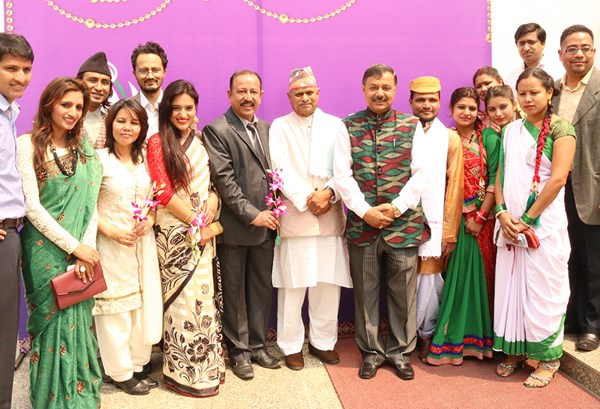SOUTH BURLINGTON, Vt., April 18, 2016 (GLOBE NEWSWIRE) -- As people gathered to celebrate the Nepali New Year, the former Nepali president was celebrating two new dramas designed to help stop child marriage. Population Media Center, a nonprofit that works on health and human rights issues globally, entertains audiences with gripping storylines and characters that role model different choices. The child marriage component of this new entertainment-oriented programming has particular relevance to the former president – he was married at age 14.
"I was married at 14. My wife was 12," said Right Honorable Former President Ram Baran Yadav who became Nepal's first President after declaration of a republic in 2008 and remained in the position till October 2015. "But that was 60 years ago. The situation on child marriage is almost the same as it was before, especially in Madhesh where I come from. Things need to change."
Population Media Center (PMC) expects that over the course of the next two years, things will change. PMC implements a specific entertainment-education model that they have implemented all over the world, impacting more than 50 countries. It puts good stories first, focusing on the importance and value of using mass media and entertainment to reach people.
In Nepal, PMC launched two new radio dramas. Hilkor ("Ripples in the Water") will run for one year (104 episodes) in the local Maithili language and Mai Sari Sunakhari ("Orchid, Like Me") will run for two years (208 episodes) in the Nepali language. Each show will broadcast two episodes per week, allowing people to get drawn into the characters as the action unfolds. In addition to child marriage, the dramas will also address girls' education, gender equity, reproductive health, and family planning, among other issues as well. Both dramas are funded by the Kendeda Fund, which focuses on girls' rights as one of its five programmatic areas of funding.
"I got the opportunity to study and became a medical doctor," said Nepal's Former President Yadav as he spoke to the crowd of 150 people. "However, my sisters did not get to go to school, only because they are girls. Now, times have changed. There are more schools and girl child have started to go to school. I never forced my daughters or my granddaughters to get married and encouraged them to continue their studies."
Nepal has one of the highest rates of child marriage in the world. For many poor families, the marriage dowry for their daughter is a necessity, and others suffer from the misperception that women who are not married early are not "pure." Girls Not Brides reports that 41 percent of Nepali girls are married before they're 18 years old and that the devastation of the 2015 earthquake has put girls and women in even more vulnerable situations that may increase rates of child marriage.
"We thank PMC for having confidence in AFN [Antenna Foundation] and in Nepal – so soon after the earthquake that devastated our country…especially at a time when most media organizations are struggling to keep themselves running," said Rajendra Prasad (Robin) Sharma, Chairperson of Antenna Foundation Nepal, a partner in the broadcast. "It is the moment when media should be performing its best in these crises."
Over the past twelve years, Antenna Foundation has established itself as one of Nepal's premier communication and production houses with a team of 50 professionals and a network that spreads across the most remote corners of Nepal. The broadcast network for Hilkor and Mai Sari Sunakhari will include Radio Nepal, Kantipur FM, and 40 stations nationwide through Ujyaalo 90 Network.
"We have made great political changes in Nepal," said Yadav. "We fought the Rana regime, fought autocratic regimes, and established democracy. However, there is much more to achieve to make social changes. I thank the Hilkor and Mai Sari Sunakhari teams and the initiation led by those behind it. This cannot be achieved overnight. It requires weeks, months, and even years."
ABOUT POPULATION MEDIA CENTER (PMC):
Population Media Center is a nonprofit, international development organization, which strives to improve the health and well-being of people around the world through the use of entertainment-education strategies, like serialized dramas on radio and television, in which characters evolve into role models for the audience for positive behavior change. Founded in 1998, PMC has years of field experience using the Sabido methodology of behavior change communications, impacting more than 50 countries around the world. www.populationmedia.org
A photo accompanying this release is available at: http://www.globenewswire.com/newsroom/prs/?pkgid=39872
